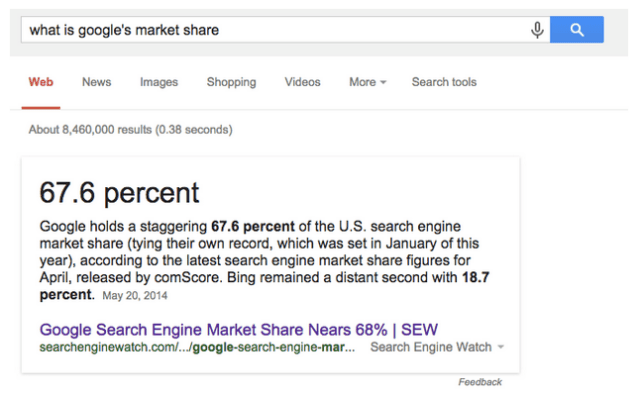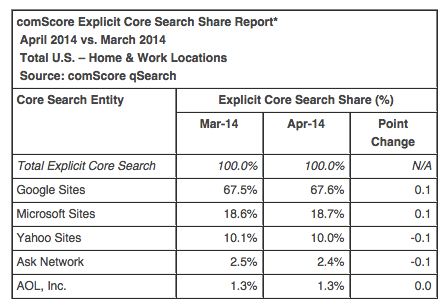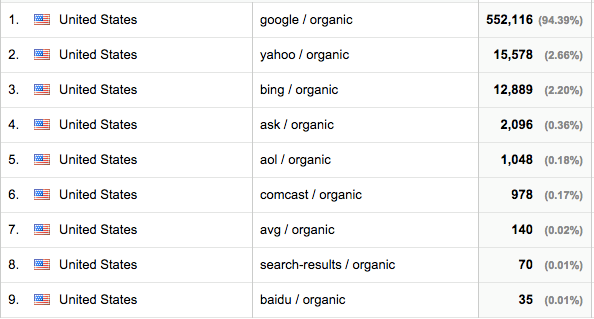“Anyone that has a monopoly will pretend that they’re in incredible competition….If the monopolists pretend not to have monopolies and the non-monopolists pretend to have monopolies, the apparent difference is very small.”
– Peter Thiel, Stanford Lecture
***
In his book Zero to One, investor Peter Thiel makes the argument that monopolists are sometimes hard to spot because they pretend to be less successful than they actually are in order to avoid drawing regulatory attention to themselves. Non-monopolists, on the other hand, will publically puff themselves up by defining their markets narrowly and by making themselves look bigger than they actually are through aggressive self-marketing.
The modern-day example that Thiel provides of a company that clearly has a monopoly is Google, which dominates web search. Thiel supplies the statistic that Google has 68% of the United States’ search market, while its rivals, Bing and Yahoo, respectively control 19% and 10%. By any account, 68% percent is dominance of market — so instead, Google points out that it only has a 3.4% share of the global advertising market and uses similar statistical obfuscations to make it seem like it is less dominant than it actually is.

This 68% market share number appears to be the generally accepted number in the press for Google’s market share in the U.S. and is based off of reports by comScore, the leading company of tracking web market share statistics. comScore puts its data together by tracking the website usage of the users in its panel, as well as by placing tracking cookies on various websites. Combined, that provides a sample to estimate how much traffic websites are getting from search engines such as Google, Bing, Yahoo, etc.
But is this figure actually correct?

The April 2014 comScore data cited by Thiel and everyone else. More up-to-date figures tell a similar story.
In our experience, 68% market share for Google feels wrong. If anything, based on years of looking at the actual traffic numbers for various websites, it seems way too low: Google is much more dominant than that.
So, we thought we’d look at Priceonomics’ traffic numbers to see how much of our search traffic comes from Google. In the past 12 months, we’ve received 803,000 visits from Google Search. Roughly 80% of those searches (585,000) were from the US, and were spread out over a wide variety of search terms (people looking up band prices, information about food trucks, the Mcdonald’s Monopoly game, Michael Jordan, etc.).
When looking at our own internal analytics, we found that 94.4% of our U.S. search traffic came from Google.

US Search Traffic to Priceonomics.com by Search Engine
Yahoo (2.7%) and Bing (2.2%) registered far behind Google. All other search engines had less than 1% of the share, combined.
In addition to sending over 94% of our U.S. search traffic, Google sends 95% of our total global search traffic, and a whopping 97% of our mobile search traffic! Having seen similar analytics from other companies, we have never seen Google sending as little as 68% of a site’s search traffic.
So, out of curiosity, we pose a question: what is your experience with Google’s share of the search traffic to your website? Does your site, like ours, receive around 94% of its search traffic from Google, or is your figure closer to the 68% that is conventional wisdom?
If 94% is truly closer to Google’s “real” market share, why is comScore’s data so off?
Applying Peter Thiel’s logic provides at least part of the answer: no one really has an incentive to correct comScore. Google isn’t going to say, “Actually we have 94.4% of the market, not 68%,” because that would just invite regulators to inspect them more closely. And what are the odds that Microsoft and Yahoo will want to fess up that, after all the time and effort they’ve put into search, they still have 2% market share when the market thinks it’s much higher? Not very likely.
Everyone in the ecosystem is pretty happy with the public thinking that Google’s market share is 68% — even if the real answer is likely much higher.
This post was written by Rohin Dhar. Follow him on Twitter. To get occasional notifications when we write blog posts, sign up for our email list.




